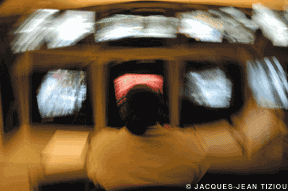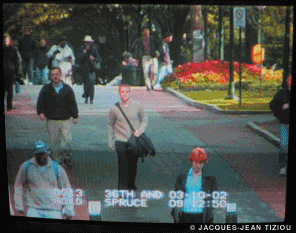Inside the communications center of Penn Public Safety, officers do video patrols. Penn won an award for combining technology and human resources to improve campus safety.
As the wallet-snatcher was leaving the Penn Bookstore, a police officer came down the street. So the thief tossed the item on top of a newspaper box and fled in the opposite direction. But he didn’t get very far. Thanks to a witness’s 511 call and a closed-circuit television camera trained on 36th and Walnut streets, Penn Police had been watching him back at its communications center and relaying information to the responding officer.
Not only did the surveillance device—one of about 400 cameras posted on or near campus—help make that arrest but it also collected valuable evidence, says Maureen Rush, vice president for public safety. “If the guy says you picked up the wrong person, we produce the videotape in court, and they view that, and it’s a slam dunk.”

Penn was honored with the Jeanne Clery Campus Safety Award this year for its campus-safety improvements, including its stepped-up use of surveillance cameras. (The award is presented each year by Howard and Connie Clery, whose daughter was murdered nine years ago in her Lehigh University dormitory.)
“They looked at our advancements in technology, our advancements in the professionalism of the police department and the security force, and they also looked at the decrease in crime,” Rush says. Overall crime on campus and in the Penn police patrol area dropped 37 percent between 1996 and 2002; armed robberies fell 62 percent.
Penn is much safer than it was a decade ago, Rush continues. Perceptions of safety have improved as well, thanks to the technology (which also includes the installation of 65 self-repairing, blue light safety phones at major intersections) and the sight of more police and security officers on foot and bike patrols. “You come out here and go to the bookstore at 11 o’clock at night, and you’re going to see tons of people in good weather hanging out, having coffee at Cosi and really enjoying themselves.”
Not all of the recent publicity about campus safety has been positive, however. A spate of crimes reported in The Daily Pennsylvanianhas raised concerns among students and prompted at least one parent to write to President Judith Rodin CW’66. More than 15 robberies took place on or near campus during the first month of the school year, according to the DP.
Arrests have already been made in some of the cases, and, Rush says, “We are proactively and immediately taking steps to counter this recent trend,” which she adds is not specific to the University City area but a citywide and national phenomenon. Among the measures taken: “Penn Public Safety has increased the number of both uniformed and plainclothes police officers and Allied Security officers on patrol during the evening and early morning hours, both on campus and in the community where the recent robberies have occurred. In addition, the University City District will deploy additional Safety Ambassadors. Commissioner Johnson of the Philadelphia Police Department has also assisted us in assigning a special unit of Philadelphia police officers to our area, [while other] local law enforcement agencies are adding additional patrols. More security cameras are being installed around campus [and] new cameras will be activated west of 40th Street. We will continue to work with the community to keep our campus and our neighborhood safe,” Rush says.

The surveillance cameras (of which 40 have high-speed, pan-tilt-zoom capabilities) will undoubtedly be a large part of that effort. Two officers are assigned specifically to “video patrol,” but at any given time there may be several officers monitoring the cameras between doing other duties. “It’s like having virtual police or security on the street,” says Rush. “They’re doing exactly what a police officer is doing in driving down the street, but in fact they’re doing it sitting behind a console with a joy stick and they’re able to go from 31st Street and Chestnut up to 41st Street and Chestnut in a millisecond.”
If suspicious activity is under way and an officer needs to be sent out, the knowledge gleaned from the cameras improves his or her safety walking onto a potential crime scene. The cameras also are a deterrent for crime, Rush believes. Signs posted near every camera inform passersby that they may be under video surveillance by the Penn police. It all sends the message that: “It’s not a good idea to commit a crime here, because you’re going to get caught.”
—S.F.

